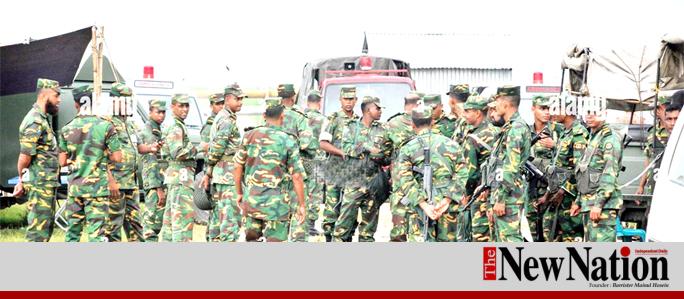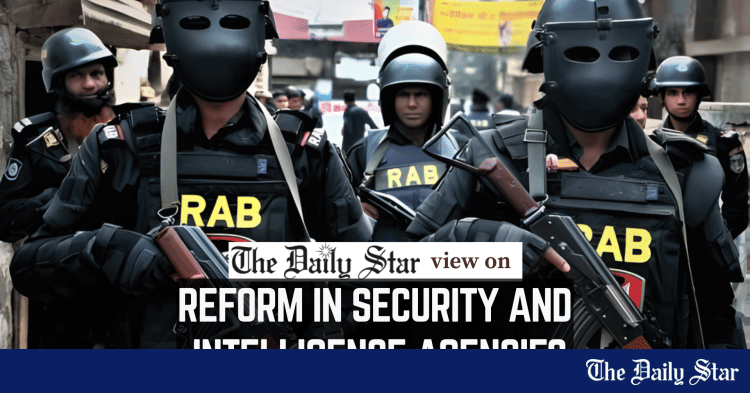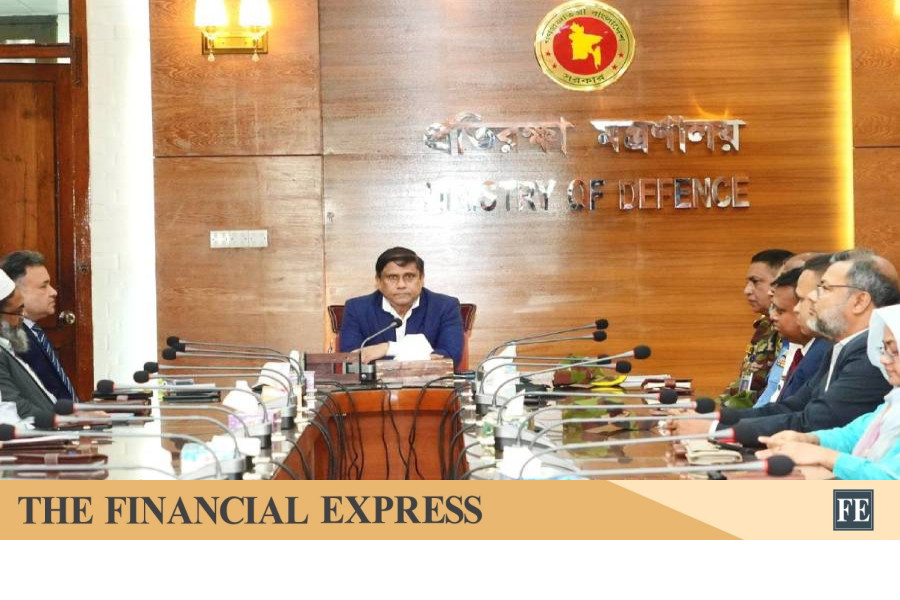Saif
Senior Member
- Joined
- Jan 24, 2024
- Messages
- 17,319
- Likes
- 8,344
- Nation

- Residence

- Axis Group


National Security Policy of Bangladesh
August 15, 2025
Dr. M A Rashid :

The National Security Policy of Bangladesh (NSP) is a state-level strategic document that sets directions to safeguard the country’s sovereignty, internal stability, economic development, and to address international security challenges.
Following the July 2024 Revolution, the Bangladesh government for the first time moved towards approving a formal National Security Strategy (NSS), marking a significant milestone in the nation’s history.
Core Objectives of the National Security Policy
1. Protecting Sovereignty and Territorial Integrity:
Sovereignty
Ensuring Bangladesh’s independent and autonomous decision-making power on all national and international matters:
Preventing foreign interference
Preserving independence of the judiciary, law, and administration
Maintaining full control over internal affairs
Territorial Integrity
Preserving the country’s map and borders; ensuring security of land, maritime boundaries, and airspace:
Preventing border disputes
Stopping smuggling and infiltration
Securing maritime boundaries and sea lanes
2. Key factors to achieve these objectives:
Strong armed forces and border security forces (BGB, Coast Guard)
Active diplomacy and international support
Intelligence surveillance and technology use
Border development, infrastructure expansion, and enhanced citizen engagement
Maintaining internal stability
3. Combating Terrorism in the Chittagong Hill Tracts (CHT):
The Chittagong Hill Tracts (Khagrachhari, Rangamati, Bandarban) are sensitive and strategically significant areas of Bangladesh where ethnic conflicts, armed group violence, and separatist activities have long persisted. Countering terrorism in this region remains a high priority for national security.
Major Challenges
1. Separatist Armed Groups:
Some tribal armed groups, allegedly supported by India, are still engaged in armed activities and extortion, demanding autonomous areas or special rights.
2. Arms and Ammunition Smuggling:
Weapons and narcotics allegedly flow into the region through India and Myanmar, funding terrorism. The hilly terrain makes surveillance difficult.
3. Extortion and Terror Financing:
Terrorist groups fund themselves by extorting local businesses, development projects, and ordinary citizens.
4. Demographic Inequality and Trust Deficit:
Longstanding mistrust, insecurity, and historical grievances persist between Bengali and indigenous communities.
5. Key Counter-Terrorism Measures
Operation Uttoron:
Joint military and administrative counter-terrorism and peace enforcement operations.
Dismantling terrorist hideouts, recovering weapons, curbing extortion
Increasing community participation in peacebuilding; involving local leadership.
Ensuring inclusion of both indigenous and Bengali populations in development projects.
Keeping youth away from extremist influence
Cross-Border Security Cooperation:
Diplomatic engagement with India’s Tripura and Mizoram states and Myanmar to curb arms smuggling
Enhanced presence of BGB and the army along borders
3. Ensuring Cybersecurity
In today’s digital era, cyberspace has become a critical yet vulnerable domain for national security. The National Security Policy identifies cybersecurity as one of its central objectives.
Major Threats
Hacking of government websites and databases
Cyberattacks on banks and financial institutions
Spreading fake information and rumors to create political instability
Cyberattacks targeting national infrastructure (power grid, telecom)
Risks of military and diplomatic information leaks
Cybersecurity Objectives
1. Critical Infrastructure Protection
Strengthening cyber defense in electricity, water, telecommunications, banking, and transportation sectors
2. Protection of Government and Military Information
Safeguarding data confidentiality and integrity
Using encryption and network security for sensitive communications
3. Preventing Cybercrime and Cyberterrorism
Cyber intelligence and monitoring against hackers, phishing, digital extortion, and disinformation
Enhancing the effectiveness of cybercrime tribunals and law enforcement
4. Cyber Policy and Legislation
o Implementing ICT Act, Digital Security Act, and National Cybersecurity Strategy
o Adopting Data Protection Act to ensure personal data security
5. Building Cyber Defense Forces and Capabilities
o Establishing and training cyber units under the military, intelligence agencies, and digital security bodies
o Strengthening the CERT (Computer Emergency Response Team)
6. Public Awareness and Education
o Raising citizen awareness about digital risks
o Launching cybersecurity training and career development programs
Ensuring cybersecurity is no longer a purely technological issue—it is now an inseparable part of state security.
Economic Security and Infrastructure Protection
Economic security and infrastructure protection are central goals of Bangladesh’s National Security Policy because sustainable security depends not only on military strength but also on economic stability, production capacity, and the security of key infrastructure.
Economic Security Means:
Stability of economic institutions and sectors
Safeguarding foreign investment, export-trade, and reserves
Ensuring energy and food security
Reducing unemployment, poverty, and inequality to maintain social stability
Infrastructure Protection Means:
Ensuring the security of airports, seaports, railways, power plants, dams, and bridges
Protecting energy, water supply, ICT, and telecommunications infrastructure
Building resilience against natural disasters, terrorism, cyberattacks, and industrial accidents
Strengthening Capacity for Climate Change and Disaster Management
Bangladesh is a climate-vulnerable and disaster-prone country. Frequent cyclones, floods, river erosion, droughts, and rising sea levels pose not only humanitarian crises but also major threats to national security. Thus, one of the key objectives of the National Security Policy is to enhance state capacity to address climate change and natural disasters.
Key Strategies:
1. Building climate-resilient infrastructure
2. Enhancing prevention and preparedness capacity
3. Implementing climate change adaptation and mitigation strategies
4. Developing policies for climate-induced displacement
5. Strengthening international cooperation and diplomacy
Balancing Foreign Policy and Regional Relations
Given Bangladesh’s strategic position at the heart of South Asia, balancing the influence, competition, and cooperation of regional and global powers is a key security concern. Therefore, a core objective of the National Security Policy is to safeguard state interests and sovereignty by maintaining strategic balance in foreign policy.
Potential Threats
Regional rivalries (India-China, U.S.-China) ? Pressure to maintain diplomatic balance
Border tensions or security issues ? Could undermine internal stability
Dependence on foreign investments and trade routes ? Strategic vulnerability
Risk of exclusion from regional alliances or cooperation mechanisms
Key Strategies
Pursuing a balanced foreign policy with India, China, the United States, Europe, and Russia
Active participation in bilateral and multilateral forums
Strengthening participation in SAARC, BIMSTEC, IORA, D-8, BBIN, BIM, etc.
Promoting regional cohesion and mutual security
Negotiating with neighbors on water, border, and security issues
Peacefully resolving transboundary river and border disputes
Controlling foreign influence in seaports, power plants, and telecom infrastructure
Implementing strategic screening of foreign investments
Ensuring security of foreign trade and shipping routes through international cooperation
Prioritizing national interests in foreign loans and agreements
Building security relationships with China, Russia, Pakistan, and Turkey to counter potential threats from India
Ensuring relations with friendly state China never deteriorate
Preventing any country, including India, from interfering in Bangladesh’s internal affairs
Using the UN Security Council to facilitate Rohingya repatriation
Maritime Security and Protection of the Blue Economy
Bangladesh’s maritime territory (approximately 118,813 sq. km Exclusive Economic Zone, as awarded by the International Court) is a major potential resource base known as the Blue Economy. Securing this domain is a critical objective of the National Security Policy.
Key Measures:
1. Protecting maritime sovereignty
2. Ensuring security and management of the Blue Economy
3. Combating smuggling and piracy at sea
4. Enhancing regional and international maritime security cooperation
Key Features of the National Security Policy
Integrated Approach
This means using all resources, institutions, and strategies across the state to ensure security—not just the military or police. In this approach, military strength is important, but so are diplomacy, economic stability, social cohesion, and technological capability.
Comprehensive Security
This philosophy goes beyond safeguarding the state and borders; it focuses on people’s lives, livelihoods, and dignity. It is a modern concept promoted by the UN and is now central to Bangladesh’s National Security Policy.
Civil-Military Coordination
National security requires close and effective coordination between the military (army, navy, air force) and civilian administration (ministries, police, RAB, health, disaster management, intelligence agencies, diplomacy).
National Security Council (NSC)
The National Security Council (NSC) is the key coordinating and policy-making body for implementing and managing Bangladesh’s National Security Policy. It must be fully institutionalized and made effective immediately.
Core Functions
1. Rapid review of national security situations and threat assessment
2. Developing and approving contingency plans
3. Authorizing joint military and civilian operations
4. Sharing and analyzing intelligence information
5. Making decisions to expand diplomatic and international security cooperation
6. Ensuring security of critical infrastructure and cyberspace
7. Bringing politicians and media talk-show participants under the scope of the policy
Special Measures
NSC Secretariat: Permanent and emergency coordination cell under the Prime Minister’s Office
Weekly or Emergency Meetings: If needed, via video conferencing
Task Forces: Subcommittees for specific threats such as cyber, terrorism, climate, etc.
Final Considerations
Bangladesh is a densely populated, climate-sensitive country facing multiple threats, including natural disasters, the Rohingya crisis, water shortages, and economic inequality. Therefore, the security framework must integrate not only the military but also administration, health, agriculture, environment, and social development. A People’s Army under the supervision of the armed forces is essential. Mandatory military training for all citizens must be implemented.
(The author is a Professor, Senior Fellow, SIPG, North South University.
August 15, 2025
Dr. M A Rashid :
The National Security Policy of Bangladesh (NSP) is a state-level strategic document that sets directions to safeguard the country’s sovereignty, internal stability, economic development, and to address international security challenges.
Following the July 2024 Revolution, the Bangladesh government for the first time moved towards approving a formal National Security Strategy (NSS), marking a significant milestone in the nation’s history.
Core Objectives of the National Security Policy
1. Protecting Sovereignty and Territorial Integrity:
Sovereignty
Ensuring Bangladesh’s independent and autonomous decision-making power on all national and international matters:
Preventing foreign interference
Preserving independence of the judiciary, law, and administration
Maintaining full control over internal affairs
Territorial Integrity
Preserving the country’s map and borders; ensuring security of land, maritime boundaries, and airspace:
Preventing border disputes
Stopping smuggling and infiltration
Securing maritime boundaries and sea lanes
2. Key factors to achieve these objectives:
Strong armed forces and border security forces (BGB, Coast Guard)
Active diplomacy and international support
Intelligence surveillance and technology use
Border development, infrastructure expansion, and enhanced citizen engagement
Maintaining internal stability
3. Combating Terrorism in the Chittagong Hill Tracts (CHT):
The Chittagong Hill Tracts (Khagrachhari, Rangamati, Bandarban) are sensitive and strategically significant areas of Bangladesh where ethnic conflicts, armed group violence, and separatist activities have long persisted. Countering terrorism in this region remains a high priority for national security.
Major Challenges
1. Separatist Armed Groups:
Some tribal armed groups, allegedly supported by India, are still engaged in armed activities and extortion, demanding autonomous areas or special rights.
2. Arms and Ammunition Smuggling:
Weapons and narcotics allegedly flow into the region through India and Myanmar, funding terrorism. The hilly terrain makes surveillance difficult.
3. Extortion and Terror Financing:
Terrorist groups fund themselves by extorting local businesses, development projects, and ordinary citizens.
4. Demographic Inequality and Trust Deficit:
Longstanding mistrust, insecurity, and historical grievances persist between Bengali and indigenous communities.
5. Key Counter-Terrorism Measures
Operation Uttoron:
Joint military and administrative counter-terrorism and peace enforcement operations.
Dismantling terrorist hideouts, recovering weapons, curbing extortion
Increasing community participation in peacebuilding; involving local leadership.
Ensuring inclusion of both indigenous and Bengali populations in development projects.
Keeping youth away from extremist influence
Cross-Border Security Cooperation:
Diplomatic engagement with India’s Tripura and Mizoram states and Myanmar to curb arms smuggling
Enhanced presence of BGB and the army along borders
3. Ensuring Cybersecurity
In today’s digital era, cyberspace has become a critical yet vulnerable domain for national security. The National Security Policy identifies cybersecurity as one of its central objectives.
Major Threats
Hacking of government websites and databases
Cyberattacks on banks and financial institutions
Spreading fake information and rumors to create political instability
Cyberattacks targeting national infrastructure (power grid, telecom)
Risks of military and diplomatic information leaks
Cybersecurity Objectives
1. Critical Infrastructure Protection
Strengthening cyber defense in electricity, water, telecommunications, banking, and transportation sectors
2. Protection of Government and Military Information
Safeguarding data confidentiality and integrity
Using encryption and network security for sensitive communications
3. Preventing Cybercrime and Cyberterrorism
Cyber intelligence and monitoring against hackers, phishing, digital extortion, and disinformation
Enhancing the effectiveness of cybercrime tribunals and law enforcement
4. Cyber Policy and Legislation
o Implementing ICT Act, Digital Security Act, and National Cybersecurity Strategy
o Adopting Data Protection Act to ensure personal data security
5. Building Cyber Defense Forces and Capabilities
o Establishing and training cyber units under the military, intelligence agencies, and digital security bodies
o Strengthening the CERT (Computer Emergency Response Team)
6. Public Awareness and Education
o Raising citizen awareness about digital risks
o Launching cybersecurity training and career development programs
Ensuring cybersecurity is no longer a purely technological issue—it is now an inseparable part of state security.
Economic Security and Infrastructure Protection
Economic security and infrastructure protection are central goals of Bangladesh’s National Security Policy because sustainable security depends not only on military strength but also on economic stability, production capacity, and the security of key infrastructure.
Economic Security Means:
Stability of economic institutions and sectors
Safeguarding foreign investment, export-trade, and reserves
Ensuring energy and food security
Reducing unemployment, poverty, and inequality to maintain social stability
Infrastructure Protection Means:
Ensuring the security of airports, seaports, railways, power plants, dams, and bridges
Protecting energy, water supply, ICT, and telecommunications infrastructure
Building resilience against natural disasters, terrorism, cyberattacks, and industrial accidents
Strengthening Capacity for Climate Change and Disaster Management
Bangladesh is a climate-vulnerable and disaster-prone country. Frequent cyclones, floods, river erosion, droughts, and rising sea levels pose not only humanitarian crises but also major threats to national security. Thus, one of the key objectives of the National Security Policy is to enhance state capacity to address climate change and natural disasters.
Key Strategies:
1. Building climate-resilient infrastructure
2. Enhancing prevention and preparedness capacity
3. Implementing climate change adaptation and mitigation strategies
4. Developing policies for climate-induced displacement
5. Strengthening international cooperation and diplomacy
Balancing Foreign Policy and Regional Relations
Given Bangladesh’s strategic position at the heart of South Asia, balancing the influence, competition, and cooperation of regional and global powers is a key security concern. Therefore, a core objective of the National Security Policy is to safeguard state interests and sovereignty by maintaining strategic balance in foreign policy.
Potential Threats
Regional rivalries (India-China, U.S.-China) ? Pressure to maintain diplomatic balance
Border tensions or security issues ? Could undermine internal stability
Dependence on foreign investments and trade routes ? Strategic vulnerability
Risk of exclusion from regional alliances or cooperation mechanisms
Key Strategies
Pursuing a balanced foreign policy with India, China, the United States, Europe, and Russia
Active participation in bilateral and multilateral forums
Strengthening participation in SAARC, BIMSTEC, IORA, D-8, BBIN, BIM, etc.
Promoting regional cohesion and mutual security
Negotiating with neighbors on water, border, and security issues
Peacefully resolving transboundary river and border disputes
Controlling foreign influence in seaports, power plants, and telecom infrastructure
Implementing strategic screening of foreign investments
Ensuring security of foreign trade and shipping routes through international cooperation
Prioritizing national interests in foreign loans and agreements
Building security relationships with China, Russia, Pakistan, and Turkey to counter potential threats from India
Ensuring relations with friendly state China never deteriorate
Preventing any country, including India, from interfering in Bangladesh’s internal affairs
Using the UN Security Council to facilitate Rohingya repatriation
Maritime Security and Protection of the Blue Economy
Bangladesh’s maritime territory (approximately 118,813 sq. km Exclusive Economic Zone, as awarded by the International Court) is a major potential resource base known as the Blue Economy. Securing this domain is a critical objective of the National Security Policy.
Key Measures:
1. Protecting maritime sovereignty
2. Ensuring security and management of the Blue Economy
3. Combating smuggling and piracy at sea
4. Enhancing regional and international maritime security cooperation
Key Features of the National Security Policy
Integrated Approach
This means using all resources, institutions, and strategies across the state to ensure security—not just the military or police. In this approach, military strength is important, but so are diplomacy, economic stability, social cohesion, and technological capability.
Comprehensive Security
This philosophy goes beyond safeguarding the state and borders; it focuses on people’s lives, livelihoods, and dignity. It is a modern concept promoted by the UN and is now central to Bangladesh’s National Security Policy.
Civil-Military Coordination
National security requires close and effective coordination between the military (army, navy, air force) and civilian administration (ministries, police, RAB, health, disaster management, intelligence agencies, diplomacy).
National Security Council (NSC)
The National Security Council (NSC) is the key coordinating and policy-making body for implementing and managing Bangladesh’s National Security Policy. It must be fully institutionalized and made effective immediately.
Core Functions
1. Rapid review of national security situations and threat assessment
2. Developing and approving contingency plans
3. Authorizing joint military and civilian operations
4. Sharing and analyzing intelligence information
5. Making decisions to expand diplomatic and international security cooperation
6. Ensuring security of critical infrastructure and cyberspace
7. Bringing politicians and media talk-show participants under the scope of the policy
Special Measures
NSC Secretariat: Permanent and emergency coordination cell under the Prime Minister’s Office
Weekly or Emergency Meetings: If needed, via video conferencing
Task Forces: Subcommittees for specific threats such as cyber, terrorism, climate, etc.
Final Considerations
Bangladesh is a densely populated, climate-sensitive country facing multiple threats, including natural disasters, the Rohingya crisis, water shortages, and economic inequality. Therefore, the security framework must integrate not only the military but also administration, health, agriculture, environment, and social development. A People’s Army under the supervision of the armed forces is essential. Mandatory military training for all citizens must be implemented.
(The author is a Professor, Senior Fellow, SIPG, North South University.






































